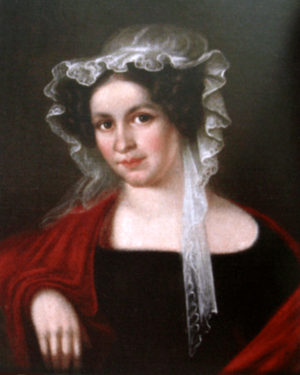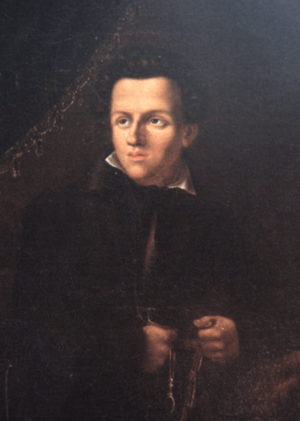Juliusz Słowacki facts for kids
Quick facts for kids
Juliusz Słowacki
|
|
|---|---|
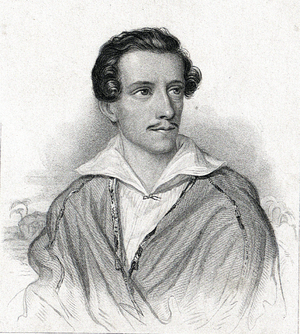
Słowacki, by James Hopwood
|
|
| Born | Juliusz Słowacki, 4 September 1809 Kremenets (Krzemieniec), Volhynian Governorate, Russian Empire (Partitioned Poland, now Ukraine) |
| Died | 3 April 1849 (aged 39) Paris, France |
| Occupation | Poet, essayist |
| Language | Polish |
| Nationality | Polish |
| Alma mater | Vilnius Imperial University |
| Period | 1830 – posthumously |
| Genre | dramas, lyrical poems |
| Literary movement | Romanticism |
| Notable works | Kordian Balladyna Anhelli Testament mój |
| Signature | |
Juliusz Słowacki (4 September 1809 – 3 April 1849) was a famous Polish Romantic poet. He is known as one of the "Three Bards" of Polish literature. These were the most important poets during the Polish Romantic period. Słowacki is also called the father of modern Polish drama.
His writings often include ideas from old Slavic stories, Polish history, and mysticism (a belief in spiritual truths). He also used new words (called neologisms) and irony in his style. While he wrote many lyrical poems, his main focus was on dramas. Some of his most popular works are the plays Kordian and Balladyna, and the poems Beniowski, Testament mój, and Anhelli.
Słowacki grew up in Kremenets (now in Ukraine) and Vilnius (in Lithuania). He worked for the Polish government for a short time. During the November Uprising in 1830, he was a messenger for the Polish revolutionary government. When the uprising failed, he had to leave Poland. Like many other Poles, he lived as an émigré (someone who leaves their home country). He lived in Paris, France, and later in Geneva, Switzerland. He also traveled to Italy, Greece, and the Middle East. He eventually returned to Paris, where he spent his last ten years. He briefly visited Poland during another uprising in 1848.
Contents
Life Story of Juliusz Słowacki
Early Life and Education
Juliusz Słowacki was born on 4 September 1809 in Kremenets. This area was once part of the Polish-Lithuanian Commonwealth but was then part of the Russian Empire. Today, it is in Ukraine.
His father, Euzebiusz Słowacki, was a Polish nobleman. He taught about writing, poetry, and Polish literature at schools in Kremenets and Vilnius Imperial University. Juliusz's father died in 1814, so his mother, Salomea Słowacka, raised him. In 1818, his mother married August Bécu, a medicine professor.
Salomea ran a "literary salon," which was like a gathering where writers and thinkers met. Here, young Juliusz met Adam Mickiewicz in 1822. Mickiewicz was another great Polish poet and the first of the "Three Bards."
Słowacki went to school at the Krzemieniec Lyceum and later studied law at Vilnius Imperial University from 1825 to 1828. He started writing poems during this time. In 1829, he moved to Warsaw and worked for the government. In early 1830, his first novel, Hugo, was published.
The November Uprising and Leaving Poland
In 1830, the November Uprising began in Poland. This was a fight for independence from Russian rule. Słowacki wrote several patriotic poems that became very popular. His poem Hymn was published in December 1830 and was reprinted many times.
In January 1831, he joined the government of the Polish revolutionaries. He worked as a copyist and later as a messenger. In March 1831, he was sent to Dresden. There, he was welcomed by other Poles who had left their country. In July 1831, he volunteered to deliver messages to London and Paris. While he was away, the uprising failed.
Life as an Émigré
Like many other Poles, Słowacki decided to stay in France as a political refugee. This meant he could not return to his home country. In 1832, he published his first collections of poems and two plays. He met Mickiewicz again, but their relationship was difficult. Słowacki felt that Mickiewicz was more popular and had even made his stepfather look bad in one of his plays. This made Słowacki see Mickiewicz as his main rival.
Because his works were not well-received by other Polish exiles in Paris, Słowacki moved to Geneva, Switzerland, in 1833. He lived there until 1836. During this time, he wrote more nationalist poems, which became more popular in Poland. He also wrote beautiful Romantic poems about nature, like In Switzerland and Separation.
In 1834, he published Kordian, a play about the Polish people's feelings after the failed uprising. This play is considered one of his best works.
Travels and Return to Paris
In 1836, Słowacki left Switzerland and traveled through Italy. In Rome, he met Zygmunt Krasiński, who was also one of the "Three Bards." Krasiński became one of the first people to seriously review Słowacki's writings. Słowacki dedicated some of his works, like Balladyna, to Krasiński.
From Italy, Słowacki traveled to Greece, Egypt, and the Middle East, including the Holy Land. He wrote about his journey in his long poem Travel to the Holy Land from Naples. Other works from this time include The Father of the Plague-stricken and Anhelli. In December 1838, he returned to Paris.
In 1840, Mickiewicz became a professor in Paris, which made him even more famous than Słowacki among the Polish community. The friendly competition between the two poets continued for the rest of their lives. Słowacki wrote two important plays in 1840 and 1841: Mazepa and Fantazy. Mazepa was the only one of his plays performed during his lifetime.
Over the next few years, Słowacki wrote many works, including Testament mój (My Last Will). In this poem, he expressed his belief that his works would be remembered after he died.
Between 1841 and 1846, he published Beniowski, which some consider his best lyrical poem. This poem started as a story about a historical person but grew into a discussion of the poet's own life and ideas. In 1842, he joined a spiritual group called the Circle of God's Cause, which also included Mickiewicz. This group influenced Słowacki's works, adding a new, mystical side to them. He left the group a year later.
Słowacki was a smart investor in the Parisian stock market. He earned enough money from his investments to focus on his writing and even pay for his books to be published.
Final Years and Legacy
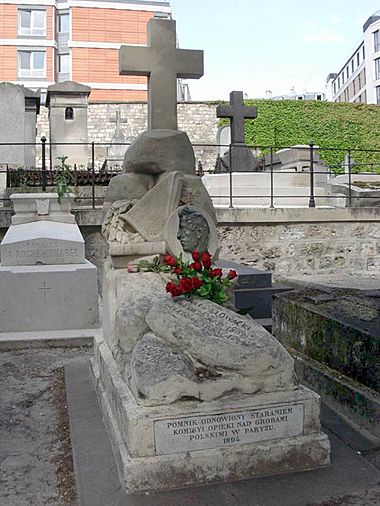
In the late 1840s, Słowacki joined a group of young exiles who wanted to return to Poland and help it become independent. One of his friends was the famous musician Frédéric Chopin.
Despite his poor health, Słowacki traveled to Poznań in 1848 when he heard about new uprisings in Europe. He hoped to join the Wielkopolska Uprising. However, the revolt was quickly stopped.
The Prussian police arrested Słowacki and sent him back to Paris. On his way, he stopped in Wrocław and saw his mother for the first time in almost twenty years. He returned to Paris in July 1848. His poem Among the discord God hits... became famous much later because it seemed to predict the election of Pope John Paul II in 1978.
Słowacki continued writing until his last days. He died in Paris on 3 April 1849, from tuberculosis. He was buried in the Montmartre Cemetery in Paris. Only about 30 people attended his funeral.
In 1927, Słowacki's remains were moved to Wawel Cathedral in Poland, where many important Polish figures are buried, including Mickiewicz. This move was a big event for Poland, showing how much he was respected.
Juliusz Słowacki's Works
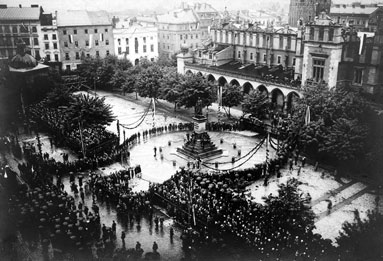
Juliusz Słowacki was a very productive writer. His complete works fill 17 volumes. He wrote 25 plays and 253 poems. He also wrote literary reviews, letters, journals, and parts of novels. He even translated some works. His letters to his mother are considered some of the best in Polish literature.
Most of his works were in Polish, but he also tried writing a few in French. Many of his writings were published only after he died. Słowacki is seen as the founder of modern Polish drama.
Słowacki's works are part of the Romantic period in Poland. They have a rich and creative vocabulary, including many new words he created. They use fantasy, mysticism, and symbolism. His writings often explore themes related to Polish history, what it means to be Polish, and Poland's place in the world.
Juliusz Słowacki's Legacy
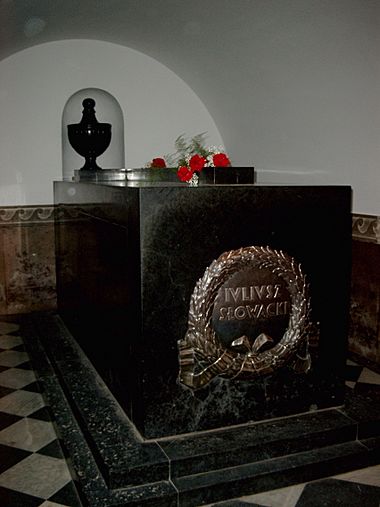
After his death, Słowacki became known as a national prophet in Poland. Today, he is considered one of the "Three Bards" of Polish literature, alongside Adam Mickiewicz and Zygmunt Krasiński.
While he was alive, Słowacki was not very popular in Paris or among other writers of his time. He wrote many plays, but only one, Mazepa, was performed during his lifetime, and he wasn't there to see it. His works were also hard to translate into other languages because they were full of Slavic myths, philosophy, and symbols.
After he died, Słowacki gained a lot of popularity in Poland, especially in Kraków. Many articles about him appeared in Polish newspapers. His works, many of which were published for the first time after his death, became very popular with a new generation of readers. He became a major literary figure for new Polish writers. He also gained respect in other countries.
In 1927, after Poland became independent again, the Polish government moved Słowacki's remains from Paris to Wawel Cathedral in Kraków. He was buried next to Mickiewicz. This was a big deal because some Church officials thought his works were controversial. It took almost 20 years and the support of Józef Piłsudski, a Polish leader who loved Słowacki's poetry, to get the Church's agreement.
Today, important places named after him include the Juliusz Słowacki Theatre in Kraków and the Juliusz Slowacki Museum in Kremenets, Ukraine. In 2009, the Polish parliament declared that year, the 200th anniversary of his birth, to be the Year of Juliusz Słowacki. In 2014, his birthday was honored with a Google Doodle.
Selected Works
Plays (Dramas)
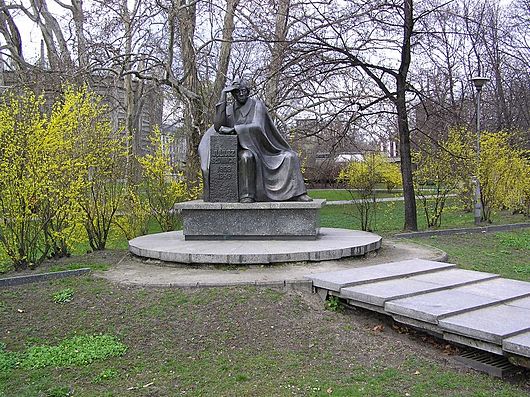
- Balladyna (written 1834, published 1839, first performed 1862)
- Fantazy (written 1841, published 1866, first performed 1867)
- Horsztyński (written 1835, published 1866, first performed 1871)
- Kordian (written 1833, published 1834, first performed 1899)
- Ksiądz Marek (Father Marek, written and published 1843, first performed 1901)
- Książę niezłomny (The Constant Prince, written 1843, published 1844, first performed 1874)
- Lilla Weneda (written 1839, published 1840, first performed 1863)
- Maria Stuart (written 1830, first performed 1862)
- Mazepa (written 1839, published 1840, performed in Hungarian 1847, performed in Polish 1851)
- Sen srebny Salomei (The Silver Dream of Salomea, written 1843, published 1844, first performed 1900)
- Samuel Zborowski (written 1845, published 1903, first performed 1911)
Poems
- Anhelli (1838)
- Arab (1830)
- Lambro, powstańca grecki (Lambro, a Greek insurgent, 1833)
- Beniowski (1841–1846)
- Genezis z Ducha (Genesis from the Spirit, 1844)
- Godzina myśli (An Hour of Thought, 1832–1833)
- Hugo. Powieść krzyżacka (Hugo. Teutonic Order Novel, 1830)
- Król-Duch (The Spirit King, parts published 1847, published in full 1925)
- Ojciec zadżumionych (The Father of the Plague-stricken, 1838)
- Podróż do ziemi świętej ("Voyage to the Holy Land", 1866)
- Testament mój (My Last Will, 1839–1840)
- W Szwajcarii (In Switzerland, 1835, published 1839)
- Wacław (1838)
See also
 In Spanish: Juliusz Słowacki para niños
In Spanish: Juliusz Słowacki para niños


